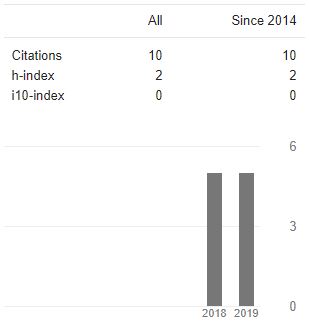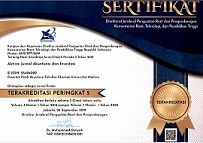IMPACT OF BEHAVIORAL ON ORGANIZATIONAL CITIZENSHIP BEHAVIOR (OCB): THE MODERATION ROLE OF JOB SATISFACTION
Abstract
In the current situation of inter-company competition, human resource development is key to the development and achievement of company goals. This study aims to examine the effect of behavior on Organizational Citizenship Behavior (OCB) and examine the role of job satisfaction as a moderating variable in the influence of behavior on OCB in one of food and beverage companies in Indonesia. The purpose of this study was to determine the effect of organizational commitment, leadership style, and organizational culture on the OCB and to determine the role of job satisfaction in the relationship between organizational commitment, leadership style, and organizational culture with OCB. The sample consists of 4,062 employees at the company. Data were analyzed using PLS-SEM with the SmartPLS application.
The results showed that organizational commitment has an effect on OCB, leadership style has no effect on OCB, organizational culture has an effect on OCB. Furthermore, job satisfaction moderated the relationship between organizational commitment and OCB, but job satisfaction does not moderate the relationship between leadership style and OCB, as well as the relationship between organizational culture and OCB.
Keywords
References
I. N. B. P. Mahardika and I. M. A. Wibawa, “Pengaruh Budaya Organisasi Kepuasan Kerja dan Komitmen Organisasional terhadap Organizational Citizenship Behavior pada Karyawan,” E-Jurnal Manajemen, 8(1), 7340-7370., 2019.
A. Syarief, M. S. Maarif, and A. Sukmawati, “Pengaruh Gaya Kepemimpinan dan Budaya Organisasi terhadap Komitmen Organisasi dan Perilaku Kewargaan Organisasi,” J. Manaj. dan Organ. 8(3), 173-188., 2017.
S. P. Robbins and T. A. Judge, Organisational Behavior., 15th ed. Bostor: Pearson, 2013.
P. J. Harper, “Exploring Forms of Organizational Citizenship Behaviors (OCB): Antecedents and Outcomes,” J. Manag. Mark. Res. 18, 1., 2015.
Wirawan, Kepemimpinan Teori, Psikologi, Perilaku Organisasi, Aplikasi dan Penelitian. Jakarta: Raja Grafindo Persada, 2013.
S. K. Khan and M. Z. A. Rashid, “The Mediating Effect of Organizational Commitment in the Organizational Culture, Leadership and Organizational Justice Relationship with Organizational Citizenship Behavior: A Study of Academicians in Private Higher Learning Institutions in Malaysia,” Int. J. Bus. Soc. Sci. 3(8)., 2012.
W.-J. Chen, “The model of service-oriented organizational citizenship behavior among international tourist hotels,” J. Hosp. Tour. Manag., vol. 29, pp. 24–32, 2016.
D. Grego-Planer, “The Relationship Between Organizational Commitment and Organizational Citizenship Behaviors in the Public and Private Sectors,” Sustain. 11(22), 6395., 2019.
S. Irvania and M. Claudia, “The Effect of Organizational Commitment and Quality of Work Life on Organizational Citizenship Behavior During Pandemic in Wastewater Management Company PD PAL Banjarmasin,” J. Wetl. Environ. Manag. 10(2), 15-24., 2022.
S. Indarti, A. A. R. Fernandes, and W. Hakim, “The Effect of OCB in Relationship Between Personality, Organizational Commitment and Job Satisfaction on Performance,” J. Manag. Dev., 2017.
K. R. Novianti, “Does Organizational Commitment Matter? Linking Transformational Leadership with Organizational Citizenship Behavior (OCB),” J. Apl. Manajemen,
E. Köse and H. Şencan, “The Effect of Decision Making Competence on Managerial Performance,” Int. J. Commer. Financ. 2(2), 1-12., 2016.
L. K. Lian and L. G. Tui, “Leadership Styles and Organizational Citizenship Behavior: The Mediating Effect of Subordinates’ Competence and Downward Influence Tactics,” J. Appl. Bus. Econ. 13(2), 59-96., 2012.
I. Kartini, “Pengaruh Gaya Kepemimpinan terhadap Organizational Citizenship Behaviour (OCB) di Politeknik LP3I Jakarta Kampus Jakarta Utara,” J. Lentera Bisnis, 6(1), 75-84., 2017.
S. Ullah, B. Raza, W. Ali, S. A. Amjad, and A. K. Jadoon, “Linking Self-efficacy and Organizational Citizenship Behavior: A Moderated Mediation Model,” Int. J. Organ. Leadership, 10(3), 233-247., 2021.
A. R. Littooij, “What effect does Leadership Style has on Organizational Citizenship Behaviour? The Effect of Transformational Leadership on Two Dimensions of OCB,” 2020.
R. A. Aras and M. Jufri, “The Effects of Leadership Style on Employees’ Job Satisfaction and Organizational Citizenship Behavior Across Hierarchical Levels,” Interdiscip. Conf. Psychol. Heal. Soc. Sci. (ICPHS 2021), pp. 227–231, 2022.
I. N. Kholisah, S. Sampeadi, and M. Apriono, “The Effect of Organizational Culture and Personality on Organizational Citizenship Behavior mediated by Organizational Commitment on the Employees of PT Bank Tabungan Negara (Persero) Tbk Jember,”
S. B. Ibrahim, U. Ahmed, and M. S. Abdullahi, “Testing the Prediction of Knowledge Sharing Behavior Through the Lens of Organizational Culture and Organizational Citizenship Behavior,” Ann. Contemp. Dev. Manag. HR (ACDMHR), 3(2), 27-40., 2021.
E. P. A. Surya and N. Qomariyah, “Makna Kerja, Budaya Organisasi dan Perilaku Kewargaan Organisasi pada Guru,” J. Psikologi, 13(1)., 2020.
E. W. Kartika and C. Pienata, “The Role of Organizational Commitment on Organizational Citizenship Behavior in Hotel Industry,” J. Manajemen, 24(3), 373-391, 2020.
A. Nazarian, P. Atkinson, P. Foroudi, and D. Edirisinghe, “Leaders or Organisations? A comparison Study of Factors Affecting Organisational Citizenship Behaviour in Independent Hotels,” Int. J. Contemp. Hosp. Manag., 2020.
W. Wasiman, “Pengaruh Gaya Kepemimpinan, Motivasi dan Komunikasi terhadap Kinerja Karyawan pada Rumah Sakit Swasta di Kota Batam,” J. Akrab Juara, 3(1), 19-30., 2018.
T. Purwati, F. A. P. Achmad, and E. Hamid, “Pengaruh Gaya Kepemimpinan dan Loyalitas terhadap Kinerja Pegawai PT. Mayora Indah Tbk.,” Al-Misbah, 3(2), 194-201., 2022.
G. Alsheikh and M. A. A. Sobihah, “Effect of behavioral variables on organizational citizenship behavior (OCB), with job satisfaction as moderating among Jordanian five-star hotels: A pilot study,” Int. J. Ethics Syst., 2019.
M. Pourkiani, A. Farokhian, and F. Gheisari, “Explaining The Relationship Between Organizational Climate, Organizational Commitment and Organizational Citizenship Behavior Among Employees of Khuzestan Gas Company,” Mediterr. J. Soc. Sci.
P. A. V. Lakshmi and N. Simarmata, “Hubungan Antara Iklim Organisasi dengan Perilaku Kewargaan Organisasi pada Karyawan di Perusahaan Ritel,” J. Psikol. Udayana, 2(1), 25-37., 2015.
S. Senewe, “Kepemimpinan Transformasional dan Organizational Citizenship Behavior Dampaknya terhadap Kinerja Pegawai KPKNL Propinsi Sulawesi Utara,” J. EMBA J. Ris. Ekon. Manajemen, Bisnis dan Akuntansi, 1(3)., 2013.
A. Tania, “Pengaruh Motivasi Kerja dan Kepuasan Kerja terhadap Komitmen Organisasional Karyawan PT. Dai Knife di Surabaya,” Agora, 1(3), 1702-1710., 2013.
K. S. Dewi, “Pengaruh gaya kepemimpinan transformasional terhadap kepuasan kerja karyawan dan komitmen organisasi pada PT. KPM,” J. manajemen, Strateg. bisnis, dan kewirausahaan, vol. 7(2), pp. 116–125, 2013.
C. Purnama, “Influence Analysis of Organizational Culture Organizational Commitment Job and Satisfaction Organizational Citizenship Behavior (OCB) toward Improved Organizational Performance,” Int. J. Business, Humanit. Technol. 3(5), 86-100., 2013.
A. E. Stiti, K. Raharjo, and D. Hamid., “The Effect Of Empowerment Of The Organizational Commitment And The Job Satisfaction Of The Employees Of The National Electricity Company (Ltd),” Asian Trans. Basic Appl. Sci. (ATBAS ISSN 2221-4291) Vol. 03 Issue 04, pp 62-86, 2013.
S. P. Robbins and T. A. Judge, Perilaku Organisasi, 16th ed. Jakarta Selatan: Salemba Empat, 2015.
K. Randeree and A. G. Chaudhry, “Leadership–Style, Satisfaction and Commitment: An Exploration in the United Arab Emirates’ Construction Sector.,” Eng. Constr. Archit. Manag., 2012.
C. Xiaoming and X. Junchen, “A Literature Review on Organizational Culture and Corporate Performance,” Int. J. Bus. Adm. 3, 2, 29-37., 2012.
W. G. Supartha, Budaya Organisasi: Teori Praktis, Kasus, dan Aplikasi Penelitian. Udayana University Press., 2008.
Y. Oemar, “Pengaruh Budaya Organisasi, Kemampuan Kerja dan Komitmen Organisasi terhadap Organizational Citizenhsip Behavior (OCB) Pegawai pada BAPPEDA Kota Pekanbaru,” J. Apl. Manajemen, 11(1), 65-76., 2013.
K. Puangyoykeaw and Y. Nishide, “Organizational Commitment and Turnover Intention in Low-Skilled Immigrant Workers in Thailand: An Empirical Assessment of Need Satisfaction, Job Satisfaction and Overall Life Satisfaction Factors,” Int. J. Bus. Manag. 10(5), 98., 2015.
R. W. Griffin and G. Moorhead, Organizational Behavior Managing People and Organizations. South-Western: Michael Schenk., 2013.
D. Fitrianasari, U. Nimran, and H. N. Utami, “Pengaruh Kompensasi dan Kepuasan Kerja terhadap Organizational Citizenship Behavior (OCB) dan Kinerja Karyawan (Studi pada Perawat Rumah Sakit Umum Darmayu di Kabupaten Ponorogo),” J. Adm. Bisnis, 7(1)., 2013.
D. P. Rini, Rusdarti., and Suparjo., “Pengaruh Komitmen Organisasi, Kepuasan Kerja dan Budaya Organisasi Terhadap Organizational Citizenship Behavior (OCB) (Studi pada PT. Plasa Simpanglima Semarang),” J. Ilm. Din. Ekon. dan Bisnis, 1(1), 69–88., 2013.
S. Y. Ratnaningsih, “Pengaruh Kepuasan Kerja dan Komitmen Organisasi terhadap Organizational Citizenship Behavior (OCB),” Media Mahardika, 11(2), 113–138., 2013.
D. A. W. S. Devi and I. G. A. D. Adnyani, “Pengaruh Kepuasan Kerja Karyawan Terhadap Komitmen Organisasional dan Organizational Citizenship Behaviour (OCB) pada PT. Maharani Prema Sakti Denpasar,” Doctoral dissertation, Udayana University, 2015.
A. S. Supriyanto, “Role of Procedural Justice, Organizational Commitment and Job Satisfaction on Job Performance: The Mediating Effects of Organizational Citizenship Behavior,” Int. J. Bus. Manag. 8(15), 57-67., 2013.
G. Andriani and D. Sofiah, “ORGANIZATIONAL CITIZENSHIP BEHAVIOR DAN KEPUASAN KERJA PADA KARYAWAN,” J. Psikol., vol. 3(01), 2012.
N. A. Wijaya and A. Yuniawan, “Analisis Pengaruh Budaya Organisasi dan Dukungan Organisasi terhadap Organizational Citizenship Behavior (OCB) dengan Komitmen Organisasi Sebagai Variabel Intervening (Studi Pada Karyawan PT Pos Indonesia (Persero) Processing Center Semarang Bagian Antara,” UNDIP, Doctoral Dissertation, 2017.
E. Setyawanti, “Pengaruh Tingkat Kecerdasan Emosi dan Sikap pada Budaya Organisasi terhadap Organizational Citizenship Behavior (OCB) Pegawai PT. PLN (Persero) Area Pelayanan dan Jaringan (APJ) Purwokerto,” Probisnis (e-Journal), 5(2)., 2012.
M. Ristiana, “Pengaruh Komitmen Organisasi Dan Kepuasan Kerja Terhadap Organizational Citizenship Behavior (OCB) dan Kinerja Karyawan Rumah Sakit Bhayangkara Trijata Denpasar,” J. Ilmu Ekon. Manajemen, 9(1), 56-70., 2013.
F. J. Wijaya, “Pengaruh Komitmen Organisasional dan Kepuasan Kerja Karyawan terhadap Organizational Citizenship Behavior (OCB) di PT XYZ Surabaya,” Agora, 2(2), 1574-1579., 2014.
R. T. Mowday, R. M. Steers, and L. W. Porter, “The measurement of organizational commitment,” J. Vocat. Behav. 14(2), 224-247., 1979.
P. G. Northouse, Leadership: Theory and Practice. Sage, 2009.
M. Sashkin and W. E. Rosenbach, “Organizational Culture Assessment Questionnaire,” 2013.
P. E. Spector, J. A. Bauer, and S. Fox, “Measurement artifacts in the assessment of counterproductive work behavior and organizational citizenship behavior: Do we know what we think we know?,” J. Appl. Psychol. 95(4), 781–790., 2010.
Wibowo, Manajemen Kinerja, 6th ed. Jakarta: Rajagrafindo Persada, 2014.
U. Sekaran and R. Bougie, Research Methods for Business: A Skill-Building Approach. Chichester: Wiley, 2016.
M. Anggraeni and M. S. Perdhana, “Kepuasan Kerja, Komitmen Organisasi Dan Turnover Intention Di PT. Hillconjaya Sakti, Cakung, Jakarta Timur,” Diponegoro J. Manag., vol. 5, no. 4, 2012.
J. F. Hair, G. T. m. Hult, C. M. Ringle, and M. Sarstedt, “A Primer on Partial Least Squares Structural Equation Modeling (PLS-SEM). Thousand Oaks,” Sage, p. 165, 2017.
G. W. Cheung and C. Wang, “Current Approaches for Assessing Convergent and Discriminant Validity with SEM: Issues and Solutions,” 2017, [Online]. Available: https://journals.aom.org/doi/abs/10.5465/AMBPP.2017.12706abstract.
J. F. Hair, G. T. M. Hult, C. Ringle, M. Sarstedt, N. Danks, and S. Ray, Partial least squares structural equation modeling (PLS-SEM) using R: A workbook. Springer, 2021.
M. Tenenhaus, V. E. Vinzi, Y. M. Chatelin, and C. Lauro, “PLS Path Modeling,” Comput. Stat. Data Anal., vol. 48, no. 1, pp. 159–205, 2005, doi: 10.1016/j.csda.2004.03.005.
S. Hussain, Z. Fangwei, A. F. Siddiqi, Z. Ali, and M. S. Shabbir, “Structural Equation Model for evaluating factors affecting quality of social infrastructure projects,” Sustainability (Switzerland), vol. 10, no. 5. 2018, doi: 10.3390/su10051415.
DOI: http://dx.doi.org/10.53712/aktiva.v7i2.1646
Refbacks
- There are currently no refbacks.
Indexing:
Member Of:
Reference Manager:
Published by Prodi Akuntansi Fakultas Ekonomi Universitas Madura
Jl. Raya Panglegur Km 3,5 Pamekasan
Phone: (0324) 322231
website: http://ejournal.unira.ac.id/index.php/jurnal_aktiva/index
Email: jaa.unira@gmail.com
AKTIVA by Universitas Madura is licensed under a Creative Commons Attribution 4.0 International License.












